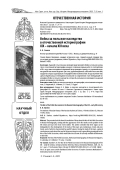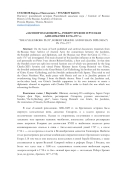В данной статье показана эволюция представлений о Войне за польское наследство в отечественной историографии, начиная с появления первых работ по этой проблеме в XIX в. и до самых последних исследований. Автор приходит к выводу, что в развитии изучения данной темы можно выделить три этапа: дореволюционный, советский и постсоветский, каждый из которых характеризуется специфическими особенностями. В ходе изучения темы сделан общий вывод о необходимости написания на современном этапе обобщающей монографии о Войне за польское наследство, которая бы учитывала все имеющиеся на данный момент достижения в этой области.
On the basis of both published and archival documents (materials from the Russian State Archive of Ancient Acts) the connections between the Jacobites, the Swedish politicians and diplomats, and the Russian tsar Peter the Great in 1716 - early 1717 are investigated. The main channel of the Jacobite influence at the Russian court and personally on Peter I was doctor Robert Erskine, a Scot and a Jacobite. At that time the Swedish court was split into several factions one of which was presented by the king Charles XII’s favorite and virtual Prime Minister baron Georg Heinrich von Görtz, the Swedish ambassador in the Great Britain Carl Gyllenborg, his brother and the secretary of Görtz Gustav Gyllenborg, and the Swedish ambassador Erik Sparre. They tried to end the Great Northern War, make peace with Russia and use it in Jacobite projects of overthrowing king George I from the British throne. Peter I used the Jacobites and, on the other hand, von Görtz’s Swedish supporters in his own interests to create a diplomatic channel to negotiate with Charles XII in order to finish the war which was exhausting for Russia.

